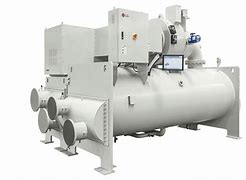Magnetic-Bearing Chiller Coimbatore

Magnetic-Bearing Chiller Coimbatore

Centrifugal, two-stage, magnetic-bearing chiller compressors equipped with variable-speed drives are a relatively new technology that operates at a high efficiency. Based on this case study, independent analysis by the U.S. Department of the Navy has verified that magnetic bearing compressors operate more efficiently than reciprocating and screw compressors, especially during partial load conditions.
The magnetic bearings allow the compressor to operate without the use of oil for lubrication, which reduces energy losses due to friction and increases the heat transfer efficiency of the chiller, because no oil enters the evaporator or the condenser. A variable speed drive on the motor allows the compressor to operate much more efficiently at partial loads than standard compressors. The oil-free system also eliminates the need for oil maintenance, resulting in operations and maintenance savings.
Office building cooling energy in the United States accounts for 7.4% of this country’s total commercial energy consumption, and chillers alone provide 31.9% of this space cooling. (The largest provider of space cooling is packaged rooftop units, which account for over So, when an improved technology is proven to be successful, it’s worth the time to explore its merits. And so, it is with magnetic-bearing chiller.
Magnetic-bearing chiller compressors are oil-free, variable speed compressors that can be installed as a retrofit to an existing chiller or within a new chiller. Digital, internally controlled, magnetic bearings reduce friction and eliminate the need for oil lubrication. The compressor is manufactured by a single company, but many manufacturers include this new compressor as part of a chiller package. Magnetic-bearing centrifugal chillers use a permanent magnet synchronous compressor motor. Such a motor has a significant efficiency increase over an induction motor, especially at low motor speeds, as shown in the figure above. Instead of physical bearings, magnetic levitation makes for a virtual frictionless operation.
Another attribute is that the lack of oil negates the downtime and maintenance costs of lubrication.
